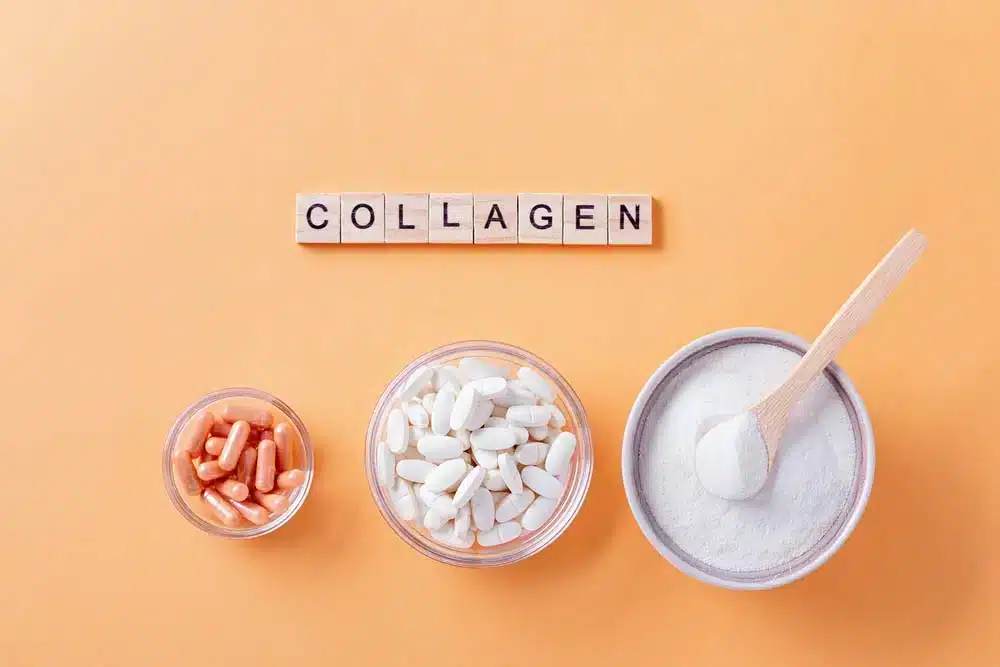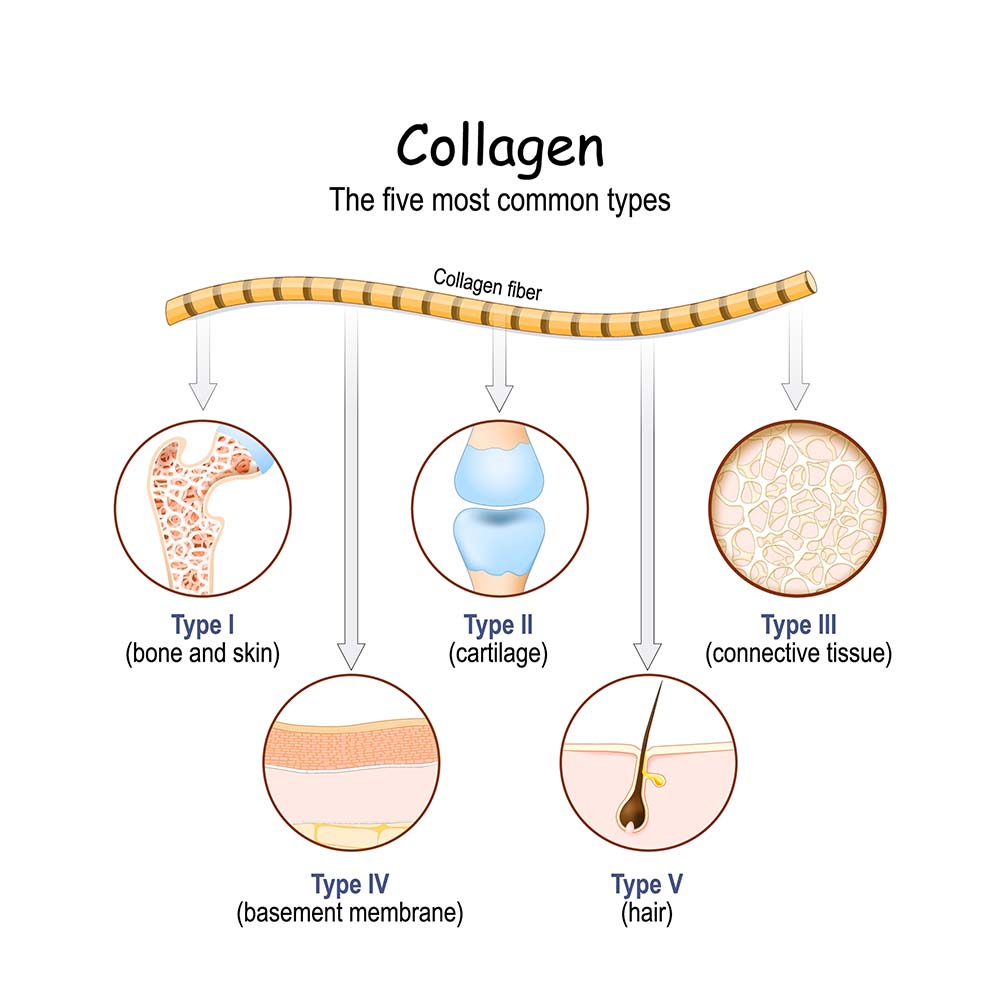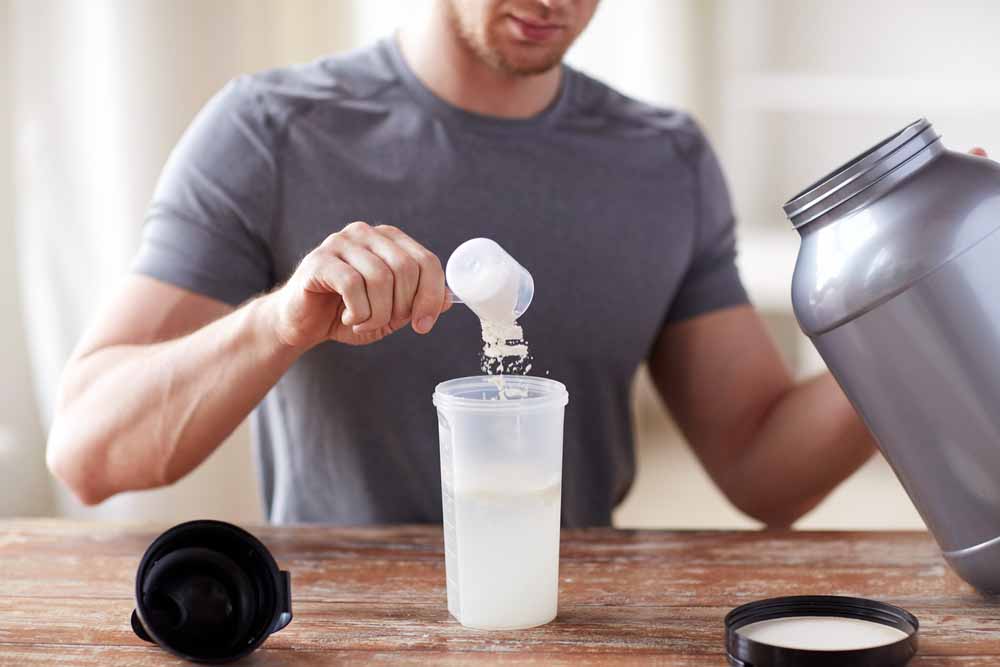If you have been paying attention to recent trends in sports nutrition, then you’ve probably heard about collagen supplementation. And if you are a climber, you have probably been introduced to the merits of collagen for climbing.
Rock climbers herald collagen for climbing because it can help build finger strength, recover from workouts faster, and prevent injuries. However, the science behind whether or not collagen actually does those things is still up for debate.
In this article, I will do my best to talk about what science actually knows about collagen, like what it is and what roles it plays in the human body. Then, I will talk about the concept of collagen supplementation and the proposed benefits collagen supplements can have for rock climbers.
From there, it’ll be up to you to decide whether or not you incorporate collagen supplements into your training routine.
What Is Collagen?

Collagen is a structural protein found in your body’s tissues. Specifically, collagen is found in your bones, cartilage, nails, hair, skin, tendons and ligaments.
Collagen is made of amino acids. The precise combination of amino acids depends on the collagen type (there are 29), but most types of collagen are made with high amounts of proline, glycine, and hydroxyproline.
Types of Collagen

Scientists have identified 29 different varieties of collagen. But considering the scope of this article being about collagen for climbing, I only want to mention five main types of collagen.
- Type I: collagen found in your bones, tendons, and ligaments.
- Type II: collagen that helps make up the cartilage in your joints.
- Type III: collagen found in your internal organ, muscles, and blood vessels.
- Type IV: collagen in the layers of your skin.
- Type V: collagen found in your corneas, skin, and hair.
For rock climbers, the most important types of collagen are types I, II, III, and V. That’s because those are the types of collagen in soft tissues, tendons and ligaments, skin, joints, and bones.
For example, type I collagen makes up over 90% of the connective tissues in ligaments and tendons.
Foods Containing Collagen

Many foods that support collagen production are recommended as part of a healthy and balanced diet. In particular, high-protein foods that contain amino acids are believed to boost your body’s ability to produce and synthesize collagen.
- Fish, including the flesh and bones
- Poultry
- Meat especially cuts with connective tissues like chuck steak
- Eggs
- Dairy products
- Legumes
- Soy
Furthermore, for collagen production to occur, research has shown that other essential vitamins and minerals are required, such as vitamin C, copper, and zinc. For example, in one of the most cited studies purporting positive benefits from collagen supplements, participants were given vitamin C and collagen (as gelatin) to catalyze collagen synthesis.
So, in terms of your body’s ability to produce collagen via the food you incorporate naturally into your diet, foods with high levels of micronutrients are the way to go (like always).
- Vitamin C: citrus fruits, berries, bell peppers, and tomatoes
- Copper: organ meats, lentils, sesame seeds, cashews, and cocoa powder
- Zinc: shellfish, legumes, meats, nuts, and seeds
What Are Collagen Supplements?

Your body naturally produces collagen by using amino acids from protein- and collagen-rich foods like animal meat and byproducts like broth and eggs.
But as you age, collagen in your body breaks down. In addition, with age, your body has a harder time producing more collagen. Factors like sun damage, aging, smoking, and alcohol consumption all decrease collagen production.
Therefore, many people, especially athletes like rock climbers, resort to collagen supplements.
Most collagen supplements contain types I, II, and III. But to be clear, supplements don’t contain collagen itself. That’s because collagen cannot be digested in its raw form.
Instead, collagen supplements have collagen peptides or hydrolyzed collagen in capsules, liquids, gummies, or powder form.
Supplements are made from the tissues of chickens, cows, pigs, or fish. For non-animal eaters, there are some vegan collagen powders on the market, but it’s unclear if they have the same proposed benefits as collagen supplements from animal products.
The dosages of collagen vary based on the guidelines of the specific product. But here’s the nutritional information for a 14-milligram dosage of collagen powdered supplement.
- Calories: 50
- Protein: 12 grams
- Fat: 0 grams
- Carbohydrates: 0 grams
- Fiber: 0 grams
- Sugar: 0 grams
The same amount of collagen peptide also contains 29 milligrams of calcium, 44.9 milligrams of sodium, and 0.98 milligrams of potassium.
The Downside of Collagen Supplements
The most prominent downside of collagen supplements is that the Food and Drug Administration (FDA) does not review them for safety or effectiveness before selling them to consumers.
Therefore, what the product exactly contains is unknown. In addition, if the supplement will do what the label promotes, it cannot be said for certain.
That’s why most sports dieticians and nutritionists recommend only using supplements that are NSF-certified or Informed Choice-certified. This means the product has been through a third-party procedure to test for notorious contaminants, banned substances, heavy metals, and more.
What are Collagen Supplements Meant To Do For Climbers?

Rock climbers are notorious for putting their connective tissues at risk. Specifically, a climber’s tendons and ligaments in their fingers and hands are prone to injury from the unique stressors that rock climbing creates.
Therefore, the concept behind supplementing with collagen is simple– the more collagen your body can synthesize, the stronger the connective tissues in your hands can become.
In other words, the more collagen your body synthesizes, the more building blocks it has available for producing more collagen, which may lead to faster recoveries, fewer injuries, and stronger fingers.
Proposed Benefits of Collagen for Climbers

There are a lot of claims about the benefits of collagen supplements. For example, in the skin care industry, collagen has been purported to improve skin, hair, and nail health. But what about climbers? Why is collagen now marketed towards climbers?
Strengthening and tendons and ligaments
Many layers form a tendon. Stick with me as I peel back the layers– the tendon itself is the largest layer, which is made up of fascicles, which is made of fibers, which is made of fibrils. A fibril is made of collagen fibrils, which are made of collagen molecules.
Therefore, by supplementing with collagen, you can provide the soft tissues in your body, like ligaments and tendons, with the essential building blocks required to be strong.
Prevention of bone, tendon, and ligament injuries
Bones contain a large percentage of collagen. Therefore, theoretically, collagen supplementation before exercise could stimulate bone remodeling and reduce the risk of fractures.
In addition, because a certain portion of tendons and ligaments are made of collagen, collagen supplementation could help reduce the risk of soft tissue injuries.
Decreasing joint pain by improving and repairing cartilage
Collagen makes up more than two-thirds of the dry weight of cartilage in joints. Specifically, Type II collagen is the most prominent type in cartilage, responsible for providing cartilage with mechanical integrity.
Therefore, as your body naturally stops producing collagen with age, collagen supplementation may counteract this process, improving and repairing cartilage in your joints and helping you recover from joint injuries.
Aiding in skin wound healing
Collagen is one of the main building blocks of your skin. Therefore, marketing schemes for collagen-containing skin care products say collagen can improve skin elasticity, reduce wrinkles, and increase blood flow.
Recommendations if You Decide to Take Collagen Supplements

Whether or not you begin a collagen supplementation program is up to you. But should you choose to begin supplementing with collagen, here are some recommendations from nutritionists and dieticians.
- Only use NSF or Informed Choice-certified products.
- You don’t have to use a supplement specifically marketed toward climbers. If it’s collagen you are after, go with the cheapest and third-party-tested product.
- If you want complete proteins to help with your training and recovery, do not solely rely on collagen. Instead, eat real, healthy food.
- If you want to build muscle and help your muscles recover, don’t use collagen. Most sports nutritionists recommend using whey protein instead.
- If you do want to supplement with collagen, be sure to take it with vitamin C before a workout and at the correct dose for at least 12 weeks.
Final Thoughts: Research About Collagen for Climbing is Inconclusive
Generally speaking, collagen research is still in its infancy. Furthermore, research specifically investigating the usage of collagen supplements for rock climbing is even more undeveloped.
This is exciting for scientists, nutritionists, and dieticians (and rock climbers) because it means there is a lot of opportunity for new science to dive into regarding the potential relationship between collagen supplements and rock climbing. For example, to see if collagen supplements can help enhance recovery, prevent injury, and improve finger strength.
However, for regular rock climbers like you and me who want to up our redpoint grade or project harder boulders, whether or not collagen supplements will help us do that is still unclear.
So, regarding improving your climbing, most nutritionists, dieticians, and medical professionals would probably recommend eating a healthy and balanced diet consisting of protein-rich foods, whole grains, vegetables, and fruits.



